It’s a typical summer morning in the Bay Area. Outside it’s sunny and the temperature hovers in the low 60s. An engineer in Sunnyvale is updating silicon for HoloLens to support new augmented reality (AR) initiatives. Several miles north near UC Berkeley, employees connect over Teams to discuss machine learning models advancing the state of conversational artificial intelligence (AI). Across the bay in San Francisco, a sales rep is coordinating remote support for a nearby customer who’s migrating services to Azure. And just down the road, finishing touches are being applied to the new 32-acre Silicon Valley Campus.
From its earliest days, Microsoft has maintained a strong presence in the Bay Area by supporting customers and growing teams that make products we’ve all come to rely on. Over the years, that foundation has supported growth through AI and machine learning, advanced silicon engineering development, and the expansion of the broader Microsoft family to include GitHub, LinkedIn, and other Bay Area startups.
There’s a common thread that binds all the products and teams that comprise the Bay Area Microsoft ecosystem. It’s spun from a spirit of innovation, entrepreneurship, and a desire to create groundbreaking technologies that improve people’s lives.
That spirit comes through in all of Microsoft’s Bay Area employees— from sales representatives to human resource specialists and engineers—and it informs how employees treat and respect each other, their customers, and their community.
Case in point: Davies Odu.
Global perspectives drive better decisions and products
Davies Odu is a software engineer on the Yammer GraphQL team. He personifies the Bay Area spirit of innovation and the drive to create impactful products, but like many of his colleagues, Odu isn’t originally from this region.
His path to Sunnyvale began more than 7,800 miles away, in central Nigeria, where he grew up. He developed a fascination for engineering and math in high school there and then studied nanoelectronics at the St. Petersburg State Electrotechnical University in Russia, where he completed his bachelor’s degree. He continued his international education journey by pursuing a master’s degree in electrical and computer engineering at Duke University in Durham, North Carolina.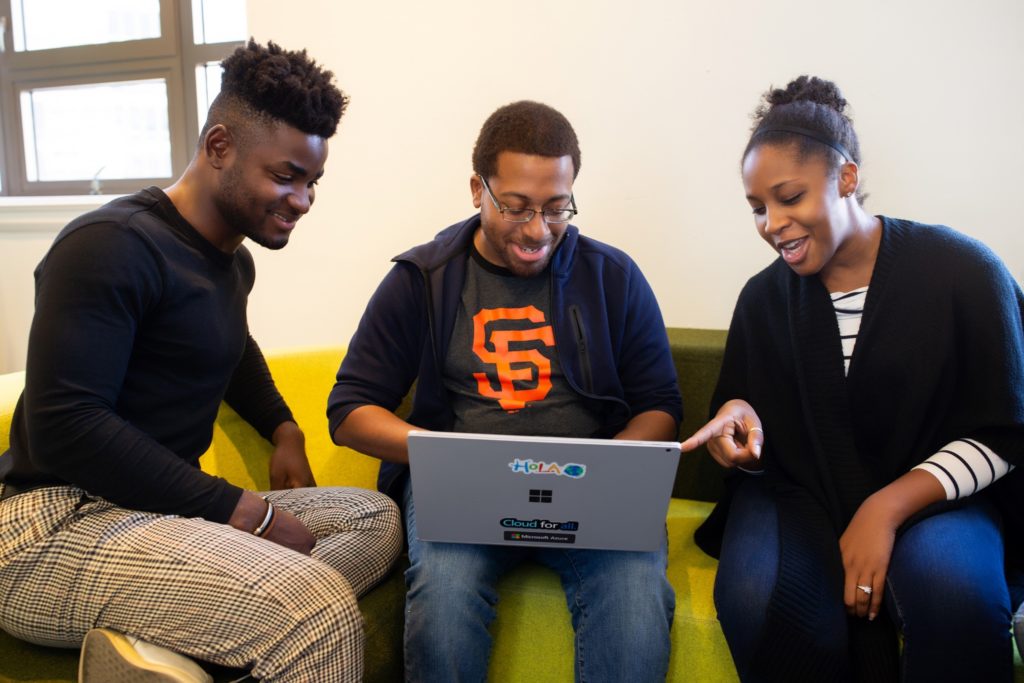
(Davies Odu (left) working with teammates earlier this year before at home orders were issued in San Francisco)
Odu was drawn to the Bay Area because of its energy and reputation as a hub for innovative technology. His experience and skill set led to multiple job offers, but the final choice for where to develop his career was easy. Odu was impressed by the smart but humble nature of the employees he met when interviewing at Microsoft.
In addition, the company’s mission—to empower every person and organization on the planet to achieve more—resonated strongly with Odu. He wasn’t interested in working on “cool” tech for its own sake; he wanted to work on innovative products that would enhance the daily lives of real people. “What you work on will affect you and everyone for generations to come. Microsoft innovates with purpose and intention,” Odu says.
“What you work on will affect you and everyone for generations to come. Microsoft innovates with purpose and intention.” —Davies Odu
As someone who’s seen many cultural perspectives, Odu also values diversity of backgrounds and opinions. Different viewpoints from a wide range of experiences lead directly to a better understanding of customer needs.
Emma Gutierrez, an HR manager supporting engineering and research across the region, couldn’t agree more.
Gutierrez hails from Guadalajara, Mexico, but came to the United States with her family when she was only 11 months old. Thanks to a great deal of personal and family sacrifice, Gutierrez was able to attend UC Berkeley for her undergraduate degree and Cornell University in Ithaca, New York, for graduate school, where she completed two master’s degrees, including an MBA. She went on to intern at Microsoft and eventually was hired as a full-time employee.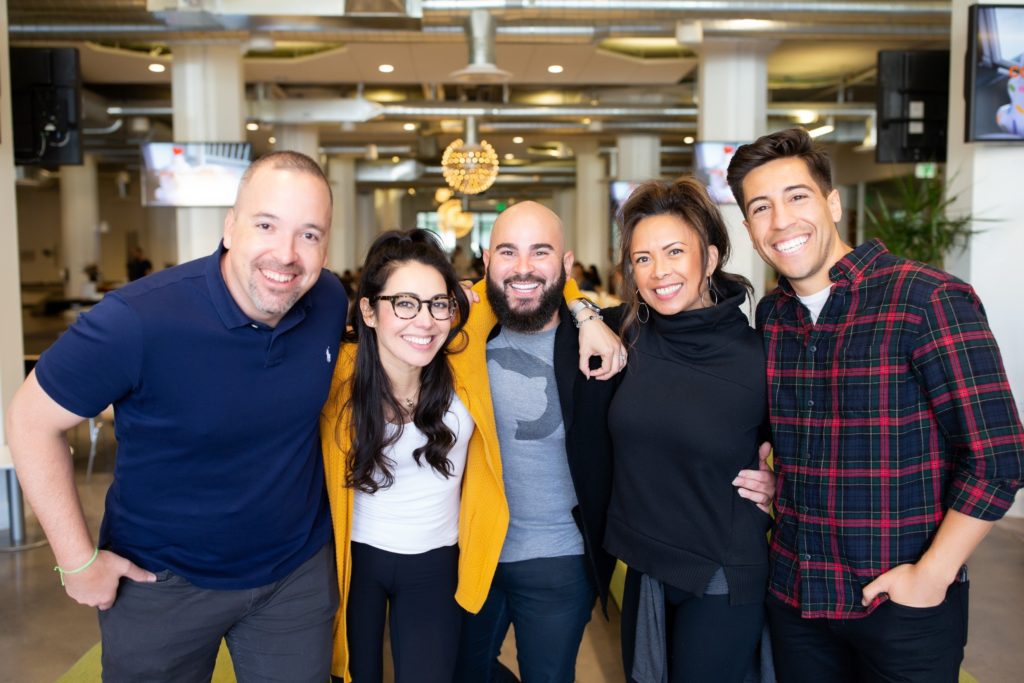
(Emma Gutierrez (second in from left) with members of the HOLA Employee Resource Group last year)
In addition to her HR work, Gutierrez is a board member with the Bay Area chapter of HOLA (Hispanic Organization of Leaders in Action). HOLA sponsors activities that allow Latinx members to share traditions and cultural experiences with colleagues at Microsoft. At past events, for example, HOLA members have related their experiences from a visit to Cuba, described Jewish Latinx traditions, and presented information on the aftermath of Hurricane Maria in Puerto Rico.
Her personal background, participation in HOLA, and work in HR have all led Gutierrez to an important realization: the more diverse a team is, the more impact it can achieve because the individuals are bringing more perspectives to the table. Gutierrez adds, “Being able to convince people who look different from you makes you a better person at selling your ideas. And better ideas lead to better products that reflect the diversity of Microsoft’s customer base.”
“Being able to convince people who look different from you makes you a better person at selling your ideas. And better ideas lead to better products that reflect the diversity of Microsoft’s customer base.” —Emma Gutierrez
Empowering employees to grow and innovate
Success for Gutierrez and her colleagues hinges on empathy and firsthand knowledge of the unique challenges faced by customers speaking a variety of languages, living with disabilities, or confronting political or cultural barriers. That’s why it’s critical for employees to reflect the same breadth of cultures, experiences, and ideas that make up Microsoft’s global customer base.
For Katy Brown, culture is foundational to everything her team does, and it begins with creating an environment where people can do their best work. Brown is Vice President Enterprise Sales, West Region, where she has the overall responsibility for more than 500 sales representatives across 11 states, providing sales and support for customers.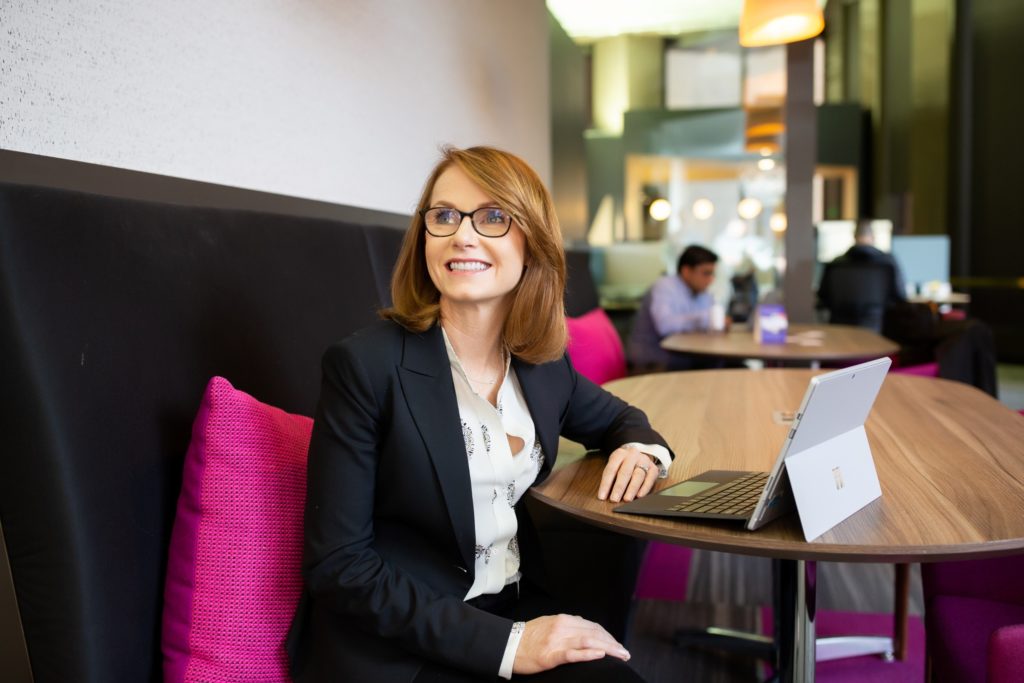
(Katy Brown, Vice President Enterprise Sales, West Region, has built a Bay Area sales team that supports many customers headquartered in the region)
According to Brown, candidates in interviews are often surprised at how “front and center” culture is at Microsoft. But for her team and the West Region, those characteristics differentiate Microsoft from the competition.
Understanding and empathy are integral to creating better products and services, but they are only part of the equation. To execute on that customer promise, employees need a work environment that encourages independence and supports the “fail fast” entrepreneurial spirit more common with smaller companies in the Bay Area.
Her employees know they have the freedom to innovate and fail fast. And they have the autonomy to form strong, long-term relationships with customers. “We’re not in one day and out the next,” says Brown. “We’re here long-term to serve our customers, to solve their problems, and to help them transform.”
“We’re here long term to serve our customers, to solve their problems, and to help them transform.” —Katy Brown
Brown also emphasizes the strong partnership between sales and other teams, including engineering. That relationship makes it easier to quickly solve problems and better enable customers to succeed with Microsoft technologies.
Babu Gopaladhine, a partner in Silicon Development, agrees, but he adds that the customer connection actually begins during the development stage.
Hardware innovation needs to be applied to solutions that are meaningful to customers, so Gopaladhine ensures that his team puts customer needs at the forefront of silicon design. “Our team makes sure that our products are what the customers are looking for, so it’s easier for them to get their work done and improve their efficiencies.”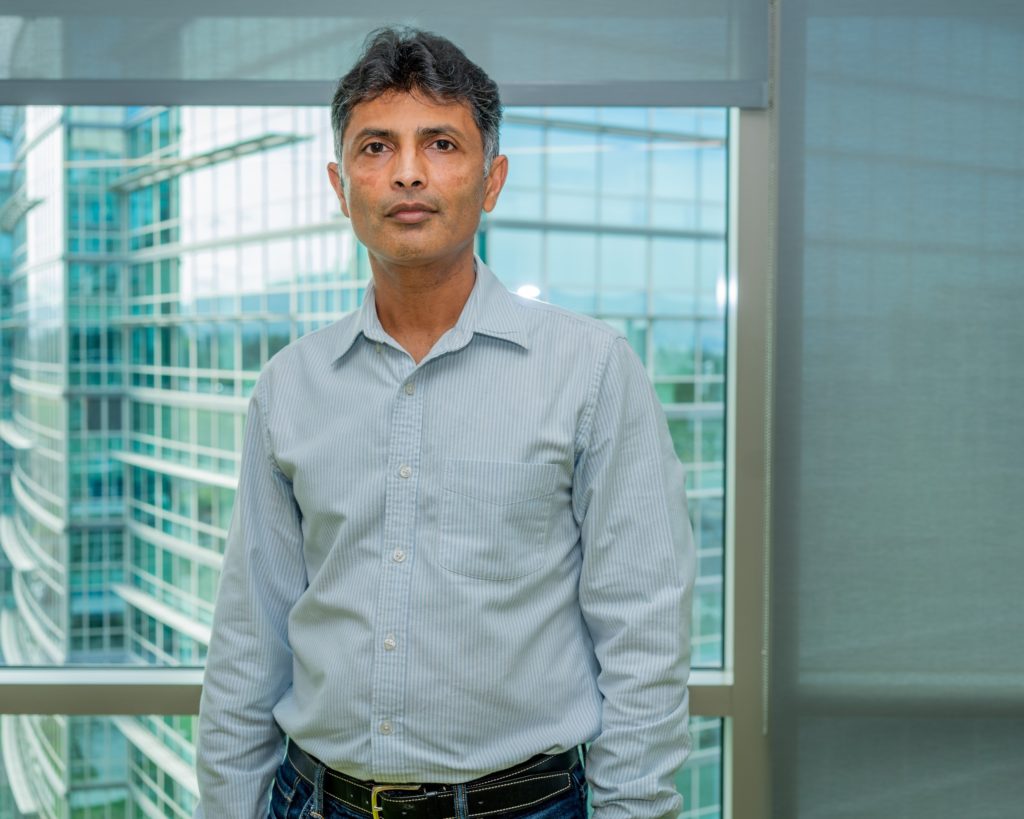
(Babu Gopaladhine, a partner in Silicon Development, sees innovation firsthand as a leader on our Silicon team down in Silicon Valley)
Indeed, Gopaladhine’s Bay Area team is in a unique position to help drive innovation, create products with a global impact, and solve customer problems in new ways. By focusing on hardware, the silicon team makes it possible for Microsoft to deliver true end-to-end computing, from the edge to the cloud to end-user devices.
Investing long term in the Bay Area
The Bay Area is a global hub for technology development, research, and education that attracts creative, innovative people from all corners of the world. Gopaladhine’s team and others in the region succeed with the help of these diverse and talented individuals. Because of its focus on culture and its growth mindset, Microsoft has been successful in building a local community that brings everyone together. This enables employees to share individual expertise in software engineering, hardware, AI, ML, and other areas with others to collectively look at how to create forward-looking products and solutions.
Within the region, Microsoft has also streamlined innovation by acquiring established Bay Area companies, such as LinkedIn and GitHub, and a variety of startups. These acquisitions allow Microsoft to rapidly advance the development of new technologies that help bolster the company’s overall mission and push digital transformation into the next generation.
Regardless of how employees come on board—whether through direct hiring or company acquisitions—Microsoft supports the product teams and family companies by fostering a culture that is inclusive and by providing an environment that is creative and energizing.
The most visible example of Microsoft’s commitment to the Bay Area sits on 32 acres in Mountain View, centrally located in the heart of Silicon Valley. A new, innovatively designed campus will be ready for employees to move in later this year in a safe and effective way.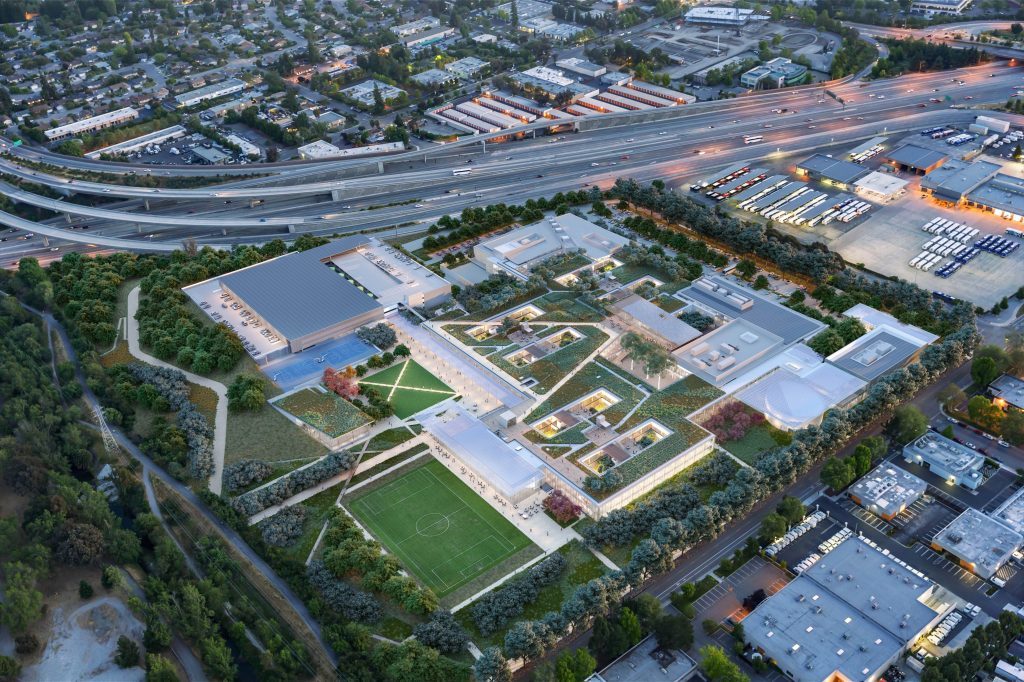
(Aerial rendering of the new Silicon Valley campus)
The new campus is designed, with sustainability in mind, to enhance the work lives of the employees. To that end, the structure is not entirely enclosed like traditional office buildings. Instead, it embraces the Bay Area climate through a courtyard concept that allows employees to move freely between inside and outside spaces while also maximizing the amount of natural sunlight that streams into the office.
Shawn Villaron is Partner Group Program Manager, PowerPoint and Office Graphics. Villaron has played an integral role in helping design the new campus with a focus on people. “We didn’t build a campus for Microsoft; we built a campus for Microsoft employees, customers, and the community. And we put employees at the center of the design to give them the ideal environment to do their best work.”
“We put employees at the center of the design to give them the ideal environment to do their best work.” —Shawn Villaron
From the new campus to the driven focus on research, sales, and engineering, Microsoft in the Bay Area is critical to the success of the company as a whole, as Rachel Evangelista, HR director, Microsoft Bay Area, points out. “The employee experience is at the heart of everything we are about. It’s what differentiates us from our competitors, and it contributes directly to our mission to empower every person and organization on the planet to achieve more.”
Today, Microsoft in the Bay Area sees a rapidly growing number of candidates who want to share in that vision and contribute to the company’s success.
According to Shawn Villaron, the reason why is simple. “If you want to work for a place where you can be your best—a place that supports diversity, inclusion, and belonging—and if you truly want to make a difference, Microsoft in the Bay Area is the place to do it.”
If you’re interested in learning what our local teams are up to, read more about the people, activities, and projects they’re working on our Microsoft Bay Area Blog. Opportunities to join them and live out our culture rooted in growth and inclusion be found here: https://aka.ms/MicrosoftBayAreaCareers



